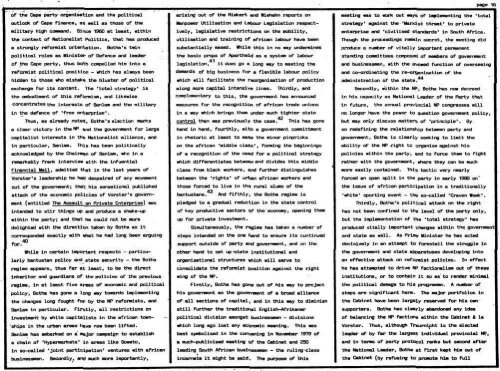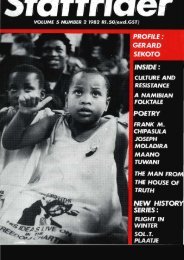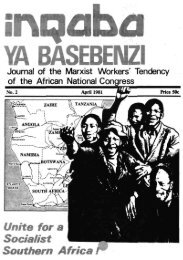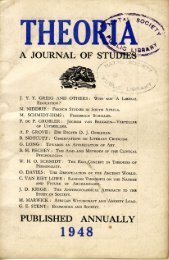Create successful ePaper yourself
Turn your PDF publications into a flip-book with our unique Google optimized e-Paper software.
of thit Cape party organisation and the political<br />
outlook of Cape finance, as soil as those of the<br />
military high cownd. Since 1960 at least, within<br />
the context of Nationalist Politics, thet has produced<br />
a strongly reformist orientation. Botha's twin<br />
political roles ee Minister* of Defence end leader<br />
of the Cape party, thus both coepelled hie Into a<br />
reformist political position - which hes elways been<br />
hidden to those who mistake the bluster of political<br />
exchange for its content. The 'total strategy' is<br />
the enbodieent of this reformism, and likewise<br />
concentrates the intereste of Sanlam end the military<br />
in the defence of 'free enterprise 1 .<br />
Thus, es already noteci, Botha's election marks<br />
a clear victory in the W* tnd the government for large<br />
capitalist interests in the Hstlonellst ellience, and<br />
in particular, Sanlam. Thi» has been politically<br />
acknowledged by the Chaliwwjn of Sanlee, who in a<br />
remarkably frenk interview with the infumntiel<br />
Financial wall, adeitted that in the lest years of<br />
Vorster's leadership he had despaired of any movement<br />
out of the governeent; thet his seneetlonel published<br />
etteck of the economic policies of vorster's govern<br />
ment (entitled The Assault on Private Enterprise) was<br />
Intended to stir things up end produce e sheke-up<br />
within the party; and thet he could not be more<br />
delighted with the direction taken by Bothe es it<br />
corresponded exactly with whet he hed long been arguing<br />
for-<br />
mhile in certeln importent respects - particu<br />
larly bentustan policy and state security - the Bothe<br />
regime appears, thus far at least, to be the direct<br />
inheritor end guardians of the policies of the previous<br />
regime, in at leest five areas of economic end political<br />
policy, Botha hes gone e long may towards lmpleeentlng<br />
the changes long fought for by the NP reformists, and<br />
Senlem In particular. Firstly, all restrictions on<br />
Investment by white cepitellsts in the efricen town<br />
ships in the urben erees hwve now been lifted.<br />
Sanlee has embarked on e major campaign to establish<br />
a chain of •Hypermarkets' In areas like Soweto,<br />
in so-called 'Joint participation* ventures with efricen<br />
buslneseean. Secondly, efwj auch more importantly,<br />
erislng out of the Rlekert and Viehehn reports on<br />
Manpower Utilisation and Labour Legislation respect<br />
ively, legislative restrictions on the mobility,<br />
utilisation and training of african labour have been<br />
substantially eased, while this in no say undermines<br />
the basic props of Apartheid as a system of labour<br />
41<br />
legislation. it does go e long way to meeting the<br />
dmeands of big business for a flexible labour policy<br />
which will facilitate the reorganisation of production<br />
along more capital Intensive lines. Thirdly, end<br />
complementary to this, the governeant has ennounced<br />
measures for the recognition of efricen trade unions<br />
in e eay which brings them under much tighter state<br />
42<br />
control than was previously the case. This hes gone<br />
hand in hand, fourthly) with e government committment<br />
in rhetoric et leeet to eeae the minor pinpricks<br />
on the african 'aiddle class*, forming the beginnings<br />
of e recognition of the need for a political strategy<br />
which differentletes between and divides this middle<br />
class from black workers, and further distinguishes<br />
between the 'rights' of urban african workers and<br />
those forced to live in th* rural slums of the<br />
43<br />
bantustans. And fifthly, the Bothe regime is<br />
pledged to a gradual reduction in the state control<br />
of key productive sectors of the economy, opening them<br />
up for private Investment.<br />
Simultaneously, the regime hea taken a number of<br />
steps Intended on the one hand to ensure its continued<br />
support outside of perty and government, end on the<br />
other hand to set up *etate lnetltutional end<br />
organisational structures which will serve to<br />
consolidate the reforejlet position against the right<br />
wing of the W.<br />
Firstly* Botha has gone out of his eay to project<br />
his government as the governeant of e broad ellience<br />
of ell sections of capital, and in this eay to diminish<br />
still further the traditional English-Afrikaner<br />
political division amongst buslneeammn - divisions<br />
which long ego lost any economic meaning. This mas<br />
beet symbolised in the convening in November 1979 of<br />
e much-publicised meeting of the Cabinet end 230<br />
leading South African businessmen - the ruling^cless<br />
lncarnete It might be said. The purpose of this<br />
1 ' muu ' ' J '••• ' ""<br />
peg* 16<br />
meeting was to work out eay* of Implementing the 'total<br />
strategy' egalnst the 'Marxist threat' to private<br />
enterprise and 'civilised stenderds' In South Africa.<br />
Though the proceedings remain secret, the meeting did<br />
produce a number of vitally importent permanent<br />
standing committees composed of members of government<br />
and businessman, with the avowed function of overseeing<br />
and co-ordinating the re-orgenlsatlon of the<br />
odminls tret ion of the state, 44<br />
Secondly, within the NF>t Botha has noe decreed<br />
in his cepecity as National Leeder of the Party that<br />
in future, the annual provincial HP congresses will<br />
no longer neve the power to question government policy,<br />
but may only discuss matter* of 'principle 1 . By<br />
so redefining the relationship between perty and<br />
government, Botha is clearly seeking to limit ttie<br />
ability of the NP right to organise egalnst his<br />
policies within the party, end to force them to fight<br />
rather with the government, where they cen be euch<br />
more easily contelned- This tactic very nearly<br />
forced en open split In the party in early I960 on*<br />
the issue of efrlcan participation in a traditionally<br />
'white' sporting event - the so-called 'Craven week*.<br />
Thirdly. Bothe's polltlcel ettack on the right<br />
has not been confined to the level of the party only,<br />
but the implementation of the *totel etretegy* has<br />
produced vitally important chenQes within the. government<br />
and state es well. As Prima minister he has acted<br />
decisively In en attempt to forestall the struggle In<br />
the government and state apparatuses developing into<br />
an effective ettack on reformist policies. In effect<br />
he has attempted to drive NP factionalism out of these<br />
Institutions, or to contain it so as to render minimal<br />
the political demags to his programme. A number of<br />
steps are significant here. The major portfolios in<br />
the Ceblnet have been largely reserved for hie own<br />
supporters. Bothe has clearly abandoned eny idee<br />
of balancing the NP factions within the Ceblnet a la<br />
Voreter. Thua, although Treumlcht la the elected<br />
leader of by far the largest individual provincial NP,<br />
end In terms of party protocol ranks but second after<br />
the National Leeder, Botha et first kept Ma out of<br />
the Cebinet (by refusing to promote him to full

















